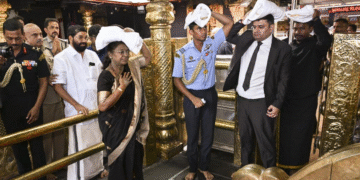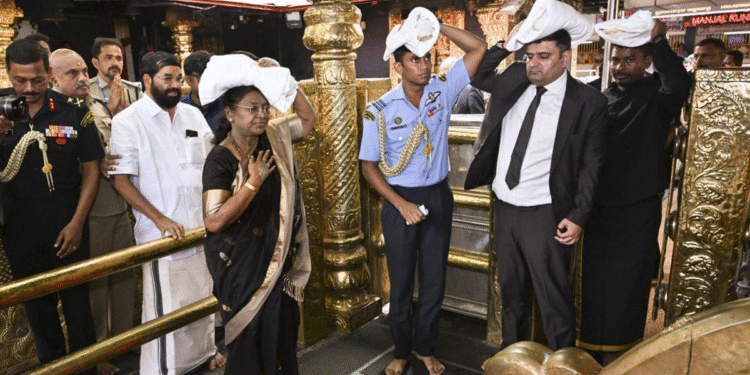Kerala DySP’s WhatsApp post about President’s Sabarimala visit sparks controversy and public debate
In a recent development that has sparked widespread debate and controversy across Kerala and beyond, a WhatsApp post by a Deputy Superintendent of Police (DySP) in Kerala concerning the President of India’s visit to the Sabarimala temple has come under scrutiny. The post has triggered political, social, and religious discussions, raising questions about the role of public officials and the boundaries of personal expression on social media platforms.
Sabarimala, one of the most revered Hindu pilgrimage sites in Kerala, has been at the center of controversies for years, especially following the Supreme Court’s 2018 verdict allowing women of all ages to enter the temple. The issue has polarized opinions, with various social and political factions voicing strong support or opposition.
The President of India’s visit to Sabarimala was seen by many as a symbolic gesture aimed at promoting communal harmony and respecting religious sentiments. However, this visit also reopened discussions and tensions around the temple’s traditions, gender rights, and political interests.
The Kerala DySP, whose identity has been disclosed in some media reports, shared a message on WhatsApp expressing personal views on the President’s visit. The content of the post reportedly questioned the timing and intent behind the visit, sparking outrage among certain groups who saw it as disrespectful or politically charged.
Screenshots of the post quickly circulated on social media, leading to public outcry and demands for an official response. Some claimed the post reflected bias or insensitivity, while others defended the officer’s right to free speech.
The WhatsApp post ignited reactions from various quarters:
- Political Parties: Opposition parties condemned the post, demanding strict action against the DySP for what they termed an irresponsible and provocative statement by a government official.
- Government Officials: The Kerala Police department issued a statement emphasizing that the post was a personal opinion and did not reflect the stance of the police force. An internal inquiry was reportedly initiated to assess whether the post violated service conduct rules.
- Religious Groups: Some Hindu organizations expressed disappointment, viewing the post as an affront to the President’s respectful visit and the sentiments of devotees.
- Civil Society and Social Media: Social media platforms were flooded with debates, memes, and opinion pieces, reflecting the divided public sentiment. While some supported the DySP’s right to personal expression, many stressed the need for neutrality from law enforcement officers.
The incident raises important questions about the boundaries of freedom of expression for public servants. Indian service conduct rules mandate neutrality and discourage officials from engaging in activities that might compromise their impartiality.
Legal experts note that while freedom of speech is a constitutional right, it is subject to reasonable restrictions, especially for government employees who represent the state.
The Kerala police force has historically enjoyed a reputation for professionalism and impartiality. Incidents like this challenge the public’s trust and highlight the delicate balance officers must maintain between personal beliefs and official responsibilities.
Experts suggest that clear guidelines and training on social media use for government officials can help prevent similar controversies in the future.
The Sabarimala issue remains a flashpoint in Kerala’s socio-political landscape. Social media platforms amplify voices on both sides, sometimes escalating tensions.
This incident underscores the need for responsible communication, especially by public figures and officials, in an era where digital statements can have far-reaching consequences.
The Kerala DySP’s WhatsApp post on the President’s Sabarimala visit has opened a complex debate on freedom of expression, public responsibility, and religious sensitivities. As the inquiry proceeds, the incident serves as a reminder of the power and pitfalls of social media for public servants and the importance of maintaining decorum in official and personal communications.















 Categories
Categories









